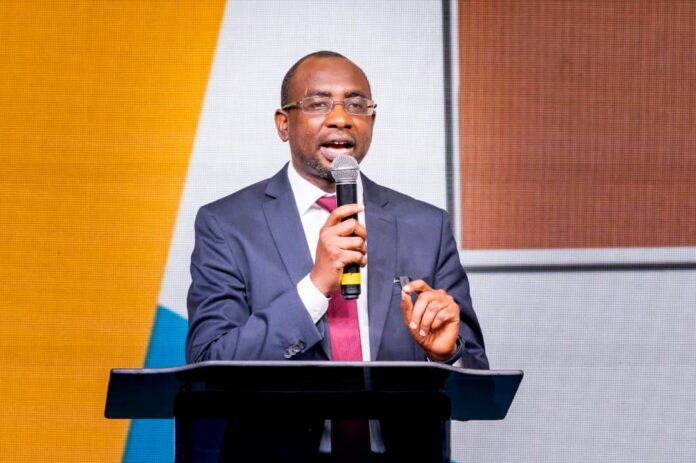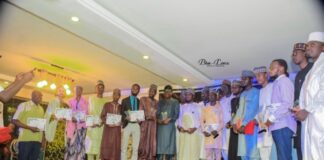NITDA Unveils e-Government Master Plan 2.0
The National Information Technology Development Agency (NITDA), has unveiled the second phase of the Nigerian e-Government Master Plan, towards ensuring a seamless and inclusive access to digital services with the aim of enhancing transparency in government processes.
The Director General, National Information Technology Development Agency (NITDA), Kashifu Inuwa CCIE made this known at the handing over of deliverables to CEOs of NITDA, National Identity Management Commission (NIMC), Nigerian Immigration Service (NIS) and the Nigerian Customs Service (NCS) on Thursday which was held at the e-Government Training Centre, Kubwa, Abuja.
The event symbolises the implementation of the first phase of the Nigerian e-Government master plan, which was sponsored by the joint implementer, the Korean International Cooperation Agency (KOICA).
Inuwa, who was represented by Mr Oladejo Olawumi, Director I T Infrastructure Solutions in the agency, said that the aim of the event was to strengthen the progress made so far and properly position the general government enterprise architecture as a cornerstone of building the foundation for digital governance in Nigeria.
The DG said under the Strategic Road map and Action Plan, which was named SRAP 2.0, the pillar of infrastructure in the project was committed to ensure seamless and inclusive access to digital services.
“The enterprise architecture is a disciplined way of organising enterprise resources, which includes business processes, data, information, tech, finance, ETC, to provide the capabilities required to consistently achieve outcomes of the organisation’s functions and mandates.
“It specifies the principles, practices, standards, and policies that guide the way capabilities enable the IT to evolve over time and continue to deliver results even under continuous changes in political, administrative, and economic conditions.
“It is therefore in line with this administration’s commitment to ensuring the implementation of sustainable initiatives and programmes that will stimulate and rejuvenate the economy.
“Federal Ministry of Communications
Innovation and digital economy’s strategic plan of driving towards a resilient, inclusive and prosperous digital Nigeria by utilising ICT to drive transparency in government as well as improve the quality and cost-effectiveness of public service delivery in Nigeria,” Inuwa explained.
Read Also:
He also noted that NITDA, in line with its mandate had developed the Nigerian Government Enterprise Architecture as part of the implementation of the first phase of the Nigerian e-government master plan.
“The framework launched in March 2019 was developed as an overarching document to guide the effective and efficient adoption and implementation of IT projects in government so that expectations and outcomes of IT projects can be achieved in the short and long term.
“The implementation has led to the development of programmes and initiatives which include the clearing of many IT projects, improvement of the national IT clearance policy drive, IT systems anddigital services assessment of 200 federal and public institutions, the Nigerian Government Enterprise Architecture portal, establishment of digital transformation technical working group DTTWG in 100 federal and public institutions, training of 442 members of the DTTWG and engagement of 10 FPIs under digital transformation performance and readiness,” he added.
He asserted that the Nigerian Government Enterprise Architecture is a critical factor in the implementation of the following e-government related regulatory instruments.
The Director General further explained that the Nigerian e-government interoperability framework was designed to enable interoperability between all the services provided by the government.
Stressing that the Digital Public infrastructure (DPI) as it were is key to the present administration’s drive towards making government services to be integrated among themselves.
He listed the national cloud computing policy and strategy; business process management guidelines,electronic document management system guidelines of FPIs, government digital service framework and digital government transformation performance assessment tool kit, among other core elements of the project.
Mr Songil Son, the Korean International Corporation Agency’s (KOICA’s) country Director,stated that ‘the project has four components,and the Enterprise Architecture is one of the components.
“NITDA is coordinating the whole process and so much progress has been made so far by properly positioning the overall government enterprises architecture as a cornerstone of building the foundation for digital governance in Nigeria’.
Earlier, representatives of Nigeria Customs Service, Nigeria Immigration Service took turns to express their optimism that the values outlined in the guide would ease the perfection of digital governance and foster inclusiveness, transparency and progress in the country.
They gave assurances that the services would be committed to leveraging the framework of the project as a catalyst for achieving the Nigeria’s strategic aspirations.




















